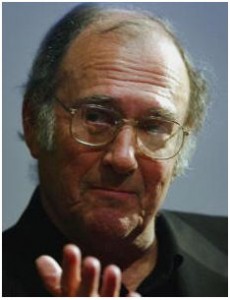Harold Pinter was such an accomplished playwright that here’s how the Nobel Academy regaled him as the winner of the Nobel Prize for Literature in 2005:
Pinter restored theater to its basic elements: an enclosed space and unpredictable dialogue, where people are at the mercy of each other and pretense crumbles. With a minimum of plot, drama emerges from the power struggle and hide-and-seek of interlocution.
 Yet there’s no denying that this British playwright, screenwriter, poet, actor, and director won far greater acclaim for his criticism of the Iraq war than for any of his 32 plays, including The Caretaker and The Homecoming, or for any of his 22 screenplays, including The French Lieutenant’s Woman and The Trial. In fact, one could be forgiven the impression that he was being awarded the Nobel Peace Prize in 2005 given the following quote from his acceptance speech:
Yet there’s no denying that this British playwright, screenwriter, poet, actor, and director won far greater acclaim for his criticism of the Iraq war than for any of his 32 plays, including The Caretaker and The Homecoming, or for any of his 22 screenplays, including The French Lieutenant’s Woman and The Trial. In fact, one could be forgiven the impression that he was being awarded the Nobel Peace Prize in 2005 given the following quote from his acceptance speech:
The invasion of Iraq was a bandit act, an act of blatant state terrorism, demonstrating absolute contempt for the concept of international law…How many people do you have to kill before you qualify to be described as a mass murderer and a war criminal? One hundred thousand?
[The United States is guilty of] supporting every right-wing military dictatorship in the world after World War II… The crimes of the United States have been systematic, constant, vicious, remorseless, but very few people have actually talked about them.
Frankly, even I – who was at least aware of the acclaim he had won for his literary works – felt that his voice was never more poignant and resonant than when he was denouncing “the overweening arrogance of American power”.
Therefore, I heartily endorsed the way my favorite interviewer, Charlie Rose, prefaced a discussion of Pinter’s criticism of the Iraq war in an interview he conducted with the playwright on March 1, 2007:
It is impossible to talk about Harold Pinter the artist without talking about Harold Pinter the political activist. For some of his political beliefs have become as noteworthy as his literature. And a few suggest that he received the Nobel Prize in part for his political beliefs. Pinter feels that the expression of his political views is not only appropriate but his duty.
Indeed, this could serve as a fitting epitaph for Pinter who died of cancer on Christmas Eve. He is survived by his wife, the equally acclaimed writer Lady Antonia Fraser. Pinter was 78.